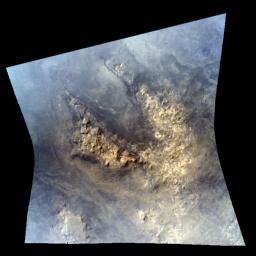
|
Growing Library of Mars Spectrometer Images
- Click the image above for a larger view
- Full-Res JPEG (720 x 720) (67.8 kB)
- Full-Res TIFF (720 x 720) (1.6 MB)
Caption:
A September 2008 release of 1,575 new images, such as this one, from the Compact Reconnaissance Imaging Spectrometer (CRISM) on NASA's Mars Reconnaissance Orbiter brings the number of released, high-resolution CRISM images to 4,580. This image in enhanced color from visible-light wavelengths shows light-toned rugged highland material in an area near the Martian equator. It covers an area about 10 kilometers or 6 miles wide.
The images from the instrument are helping researchers learn what minerals are on the Martian surface at many areas, including candidate landing sites for future Mars missions.
The images are on the CRISM Web site, http://crism.jhuapl.edu/ , which also offers an online map showing the locations on Mars for which the spectrometer images are available. Images specifically for supporting the evaluation of candidate landing sites are also at links from http://crism.jhuapl.edu/msl_landing_sites/index.php#label5 .
Background Info:
CRISM is one of six science instruments on the Mars Reconnaissance Orbiter. Led by The Johns Hopkins University Applied Physics Laboratory, Laurel, Md., the CRISM team includes expertise from universities, government agencies and small businesses in the United States and abroad. NASA's Jet Propulsion Laboratory, a division of the California Institute of Technology in Pasadena, manages the Mars Reconnaissance Orbiter for NASA's Science Mission Directorate, Washington. Lockheed Martin Space Systems, Denver, built the orbiter.
Cataloging Keywords:
| Name | Value | Additional Values |
|---|---|---|
| Target | Mars | |
| System | ||
| Target Type | Planet | |
| Mission | Mars Reconnaissance Orbiter (MRO) | |
| Instrument Host | Mars Reconnaissance Orbiter | |
| Host Type | Orbiter | |
| Instrument | Compact Reconnaissance Imaging Spectrometer for Mars (CRISM) | |
| Detector | ||
| Extra Keywords | Color, Map | |
| Acquisition Date | ||
| Release Date | 2008-09-19 | |
| Date in Caption | ||
| Image Credit | NASA/JPL-Caltech/JHUAPL | |
| Source | photojournal.jpl.nasa.gov/catalog/PIA11175 | |
| Identifier | PIA11175 | |
